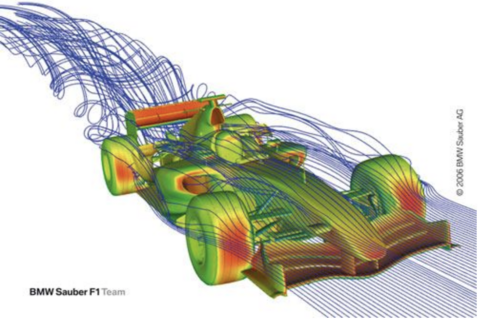Deep Learning in CFD @ BMW
This project was for summer term 2020, you CAN NOT apply to this project anymore!

- Sponsored by: BMW
- Loop of knowledge: Marija Tepegjozova
- Project Lead: Dr. Ricardo Acevedo Cabra
- Scientific Lead: Dr. Babak Gholami and M.Sc. Laure Vuaille
- Co-Mentor: Marija Tepegjozova
- Term: Summer semester 2020

Results of this project are explained in detail in the final documentation and presentation.
Fluid dynamics (ex: drag, lift) play an important role in the performance of racing cars. For optimizing racing car designs, Computational fluid Dynamics (CFD) simulations are typically performed to solve numerically the fluid phenomena interacting with the car under racing conditions. These phenomena are highly nonlinear and non-deterministic, therefore the high accuracy of CFD is required. Moreover, the design is typically optimized iteratively, that is a new CFD simulation is performed after every small changes in the design until convergence towards the target criteria. On the downside of the high accuracy obtained, CFD simulations are costly and this iterative optimization process is lengthy and sometimes redundant.
In this project we propose to investigate the performance of Deep Learning for predicting the results of such CFD simulations. Our aim is to accelerate the design process by delivering approximate fluid predictions very fast, and thus direct the engineer towards the optimal design in shorter time.
Recently the use of Deep Learning in Engineering is taking momentum. New architectures such as Geodesic Convolutional Networks are able to analyze 3D non-structured meshes and perform regression or classification of physical scalars and fields. We propose to apply such methods to benchmark CFD simulations to evaluate the prediction of velocity and pressure fields under different fluid flow regimes (laminar, turbulent) and different geometries.